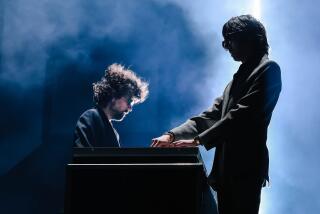POP MUSIC REVIEW : CLASSIC JUJU AT THE PALACE
- Share via
America had its chance to embrace Nigerian pop music a couple of years ago when the charismatic King Sunny Ade got his big push. But predictions by boosters and record company officials that the bandleader and guitarist would succeed Bob Marley as an international superstar proved overly optimistic, and, while Ade remains a dominant force in Nigeria, he’s no longer on an American label.
Now that the hype has died down and the African pop movement in the United States has returned to the specialist audience it had before, Nigerian music’s other major figure, Chief Commander Ebenezer Obey, is making his first American tour.
He and his 16-member band, the Inter-Reformers, filled the Palace with the charged polyrhythms of classic juju music Wednesday night, but didn’t show anything that would encourage another Ade-style campaign for an American following.
Obey’s lineup, sound and show pretty much followed the blueprint Ade laid down when he came through town. Colorfully garbed musicians--in their robes and headgear, the “talking drums” players looked like bishops in some wild, wiggy church--hammered out extended, rhythm-oriented pieces on an arsenal of drums, percussion instruments and two electric basses. Four guitars and a pedal-steel established melody lines that were often submerged in the pounding tide.
Obey and his front line of singer-dancers tossed off vocal harmonies that were simultaneously sweet and lusty, and the three dancers kept themselves busy with nonstop, semi-slapstick routines that involved broad, mischievous mugging. You didn’t have to be fluent in Yoruba to get the essential message.
Wednesday’s show was also livened by several episodes of “dashing,” a traditional gesture of respect in which audience members dance on to the stage and slap dollar bills on Obey’s forehead. Every little bit counts when you’re touring with a band this big.
Obey and Ade are both credited with making innovations in the juju style, but on a show-to-show comparison, Ade comes out ahead as the more daring musician, with his strongly personal lead guitar work and some spacy touches from the synthesizer. Obey, whose sound was earthier and more primitive, conveyed a warm, benign personality, but he didn’t command your attention like the radiant Ade.
Maybe that search for a focal point is a Western peculiarity that’s foreign to practitioners of this celebrative form. You have to remember that in its natural social context, juju is party music, and much of its impact comes with the cumulative force of hours of nonstop playing and dancing. The samples we’ve seen from Nigeria’s two main men only make you long for the full treatment.
More to Read
The biggest entertainment stories
Get our big stories about Hollywood, film, television, music, arts, culture and more right in your inbox as soon as they publish.
You may occasionally receive promotional content from the Los Angeles Times.










